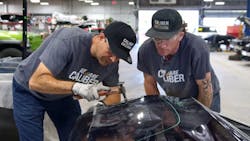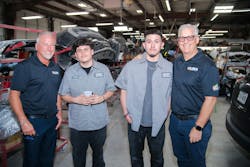Most kids growing up have an idol. Whether it’s the quarterback of their hometown football team, an author who captured their imagination with each book they published or the lead actor from their favorite movie, there is someone who sticks in their mind and becomes the example of success they aspire to.
My idol growing up, like many kids my age from St. Louis, was Albert Pujols, the future Hall of Fame first baseman for the Cardinals. He was the best player in the majors at the time, and he embodied everything a kid could want to be.
Idols are important – they give people something to believe in, to rally behind. But eventually, there comes a point when we all have to face reality and accept that our idols are just that – idols. Their success, though inspiring, isn’t attainable for the average person.
Instead, we all reach a point in our lives where we need to figure out what we want to be doing. When we make that decision, we need to find people that are willing to show us the ropes and guide us through that journey.
We need mentors.
In my junior year of high school, I was thinking about what I wanted my life post-graduation to look like. Despite my admiration for Pujols, I decided that sports weren’t for me (okay, okay, it really wasn’t a decision. There’s a reason I’m a writer, and it’s not because I can bat .300 and average 40 home runs a season). I knew I liked writing and telling stories, and my English teacher recognized that. He encouraged me, gave me extra projects to work on to hone my craft, and he helped fuel my desire to get better.
Throughout every stage of my professional career, I’ve had at least one person I’ve considered to be a mentor in my corner. They’ve all had different approaches, but they’ve all cared about my success, and they’ve all helped push me to be better than I am.
Regardless of whether someone’s a ball player, a writer or a body technician, they will be more successful if they have someone with experience in their field helping them. A 2023 Forbes article i highlights the advantages of mentorship, including expanded networks, relevant experience and increased opportunities to advance their careers.
“Having a mentor is more than just setting and achieving goals,” the article says. “it's about having someone in your corner who can provide valuable feedback, encouragement and support to help you grow both professionally and personally.”
The automotive aftermarket is in a constant state of flux, and it’s changing rapidly. Andrew Vaccaro, director of apprenticeships and training programs with Caliber Collision, says that while there are a number of ways shops can attempt to keep up, establishing and maintaining an apprenticeship or mentorship program is a highly effective way to make sure your newer technicians are receiving the education and building the relationships they need to become high-performing team members.
“As modern cars continue to become more complex, and the required skills become more technology-focused, this industry demands more highly skilled workers,” Vaccaro says. “Apprentices have a tremendous opportunity to join an industry during a significant transformation.”
In with the Old and the New
The automotive landscape is filled with a blend of old and new. Shops need to have the ability to work on 30-year-old cars as well as cars that just rolled off the lot yesterday.
It’s a similar scenario to the people working on cars. Scott Benavidez is the owner of Mr. B's Paint & Body in Albuquerque, New Mexico, and is chairman of the board of directors for the Automotive Service Association. He says that shops are most effective when they embrace a blend of old and new.
“The older technicians have a lot of information with them, a lot of institutional knowledge,” Benavidez says. “And kids these days aren’t afraid of the technological advancements. They’re not scared to plug a computer into the car. You need both.”
Benavidez says that while it isn’t always easy getting younger generations to collaborate with and listen to older generations, there is generally an eagerness to learn and an eagerness to teach from both sides.
Vaccaro agrees, and he adds that mentorship opportunities at Caliber have resulted in greater workforce retention for their shops because it gives further career options for our technicians that previously didn’t exist.
Though it has several avenues through which technicians can volunteer, Caliber has a formal mentorship program called the Technician Apprenticeship Program, or TAP for short. Anyone that is interested in becoming a technician can apply online for an in-shop mentorship with a Caliber technician.
“The industry needs new, innovative ways to bring more technicians into the field and make sure they have the training required to meet today’s standards,” Vaccaro says. “It is a competency-based program, so in addition to working in a real-shop setting, apprentices also complete all the necessary industry-standard certifications and training to be proficient in the industry.”
Mentorship requires a large investment. Vaccaro says Caliber has invested around $65 million into TAP since the program’s inception. Though most shops won’t spend nearly that much money on an apprenticeship program – Caliber has more than 1,800 locations across 41 states – it still needs proper resources to be effective.
If you invest properly, though, Vaccaro says the results speak for themselves. Caliber has graduated around 2,300 technicians through TAP, and anyone who completes the program receives immediate job placement at any Caliber location.
Vaccaro says investing in mentorship doesn’t only benefit your shop, but the industry as a whole.
“We’re focused on leveraging our industry strengths and leadership to usher in a new generation of skilled technicians, but overall, we want to promote the health of the industry,” Vaccaro says. “Developing skilled technicians who become experts in their craft is a win for the entire industry and provides a sustainable talent pipeline for Caliber.”
Third-Party Vendors
Another benefit to having a formal mentorship or apprenticeship program is that it gives you an opportunity to partner with third-party training vendors.
In addition to having TAP, Caliber also partners with 3M for some training modules. Andrew Robinson, key account manager for 3M’s Automotive Aftermarket Division, says his company works with OEMs on “multiple levels,” which helps them keep their training modules on the cutting edge.
“We work diligently every day on developing products and training to ensure we provide the best materials and precise application instructions to achieve proper repairs and the best OEM replication possible,” Robinson says. “TAP students can rely on the 3M training team to keep them up to date on the latest applications and processes in collision repair.”
On a more basic level, third-party training partners can also help teach the basics, easing the burden of catching new technicians up to speed. Robinson says 3M helps teach apprentices how to pull repair procedures, the proper preparation of bare metal and plastic substrates, corrosion protection, and other fundamentals.
This helps ease some of the burden of developing curriculum, and it also provides your mentoring technicians with more guidance on what they should be teaching mentees.
On a more local level, it also provides a great opportunity for community outreach while still building your own talent pipeline. Benavidez and his shop have partnered with a local high school to restart the school’s automotive shop class. He says that a lot of young people these days aren’t exposed to vehicle repair like they were when he was a kid.
“We used to be able to get directly inside the engine compartments of cars in our driveways with our dads,” Benavidez says. “You can’t do that with modern cars.”
By having the school teach the basics in a hands-on shop class, Benavidez says his shop is giving students a much-needed opportunity to see a different kind of career path than just going to college, and it secures a stream of competent potential employees that can come into his shop and continue to learn.
“Our industry needs people,” he says. “These kids want to work right now.”
A Lot to Offer
Mentorships, if executed correctly, can be a very beneficial two-way relationship. Vaccaro says it’s essential to make sure any mentorship program your shop tries to implement is well-supported and that meaningful efforts are made to create awareness.
It’s also essential to get buy-in from your current technicians, as they’re the ones who will be teaching any apprentices.
“What makes TAP so unique and impactful is that our experienced technicians want our apprentices to succeed,” Vaccaro says. “TAP provides them with an additional opportunity to share their knowledge with young men and women, providing them with a stable career while creating a lasting legacy in the industry.”
If you can get that buy-in with your current technicians, it becomes significantly easier to implement a mentorship program.
Though mentorship programs aren’t the silver bullet to the industry’s technician shortage, they can be a key tool in combating it. The industry has changed a lot over the last few decades, and Benavidez says that change is for the better. If shops can get prospective employees in as apprentices, they’ll quickly learn just how good a life they can make in the automotive aftermarket.
“We’re not out of the game,” he says. “We have a lot to offer.”
About the Author

Noah Brown
Noah Brown is a freelance writer and former senior digital editor for 10 Missions Media, where he facilitated multimedia production several of the company's publications.



